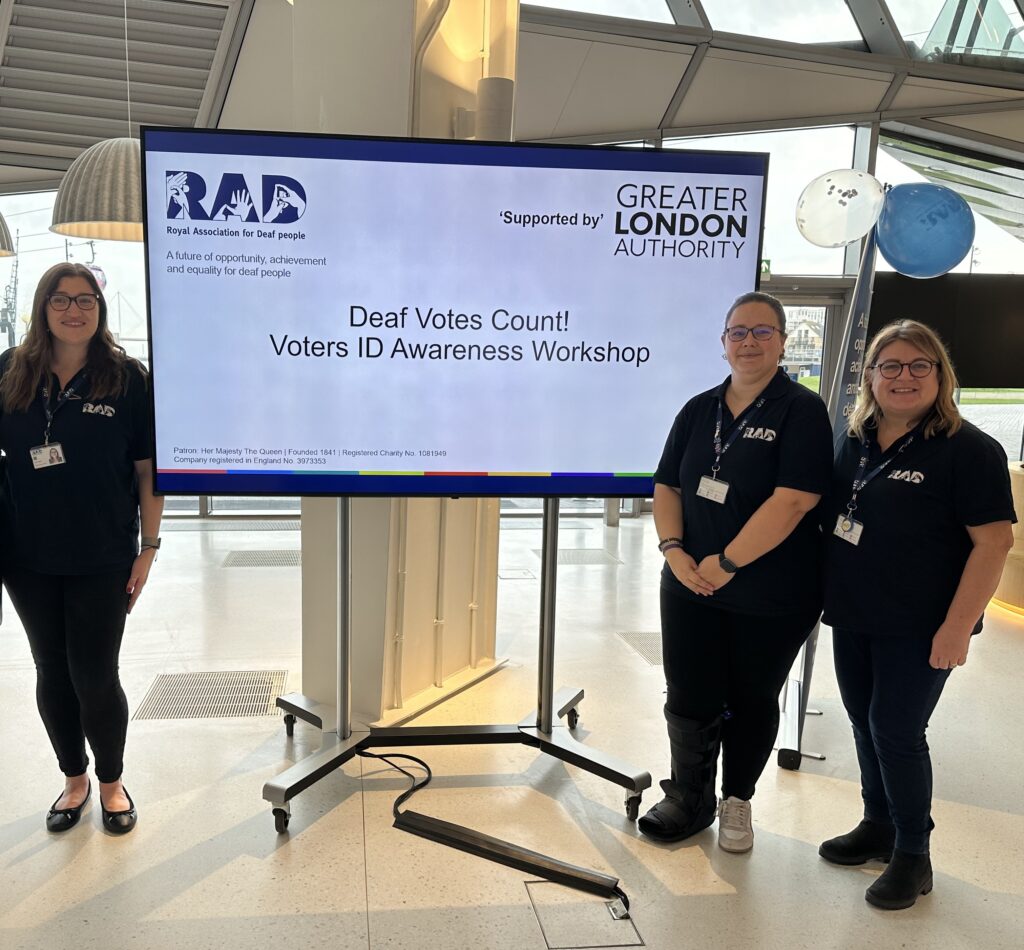Deaf Votes Count! A vlog by the Royal Association for Deaf people (RAD)

A vlog by the Royal Association for Deaf people (RAD)
Thanks to funding from the Greater London Authority’s Voter ID grants programme, which ran from August 2023- February 2024, RAD worked with deaf Londoners, sharing information about how to vote, registering, and the new Voter ID requirements.
This was conducted in British Sign Language (BSL), the first language of the Deaf Community, which is completely different from English. This was very welcome, but of course the next question that comes up is “Who should I be voting for?”
RAD’s advice workers couldn’t directly answer that question, as we have to b
e politically neutral. And we couldn’t signpost deaf people to reliable sources of party political information in BSL because there aren’t any.
How can deaf people make informed choices without access to information from those who seek their votes?
The media. You see political broadcasts on the television, in the news and on social media, but how often do you see these made accessible? Sometimes there are subtitles, but this isn’t the solution for all deaf people who may struggle to understand English, as it isn’t their first language. For full comprehension, it needs to be available in British Sign Language (BSL).
Political jargon. With any political campaign or government messaging, these can often contain jargon or even a play on words which does not translate into BSL. The lack of accessible campaign messages prevents deaf people from having full access to make an informed decision.
Political parties. Very often our advice workers are asked “what does each of the political parties stand for?” There are a multitude of questions around local issues, and where each party stands on certain topics. It is clear, there is no access to information from local to national party political campaigns or manifestos.
Minority. As a minority group, the needs of the deaf community
are often overlooked. Very little is done to ensure accessibility is met in accordance with The Equality Act. There is often quite a lot of uproar within the deaf community, fighting for justice and accessibility. Rather than feeling like valued members of society, the battle is constantly around being treated as an equal and overcoming barriers, rather than being able to join the wider political debates.
Whose Britain? Political campaigns are often about competing visions for the future of Britain, but with lack of access, how can deaf people contribute effectively to the ambitions of shaping the country?
Misinformation. When a deaf person is told something by a friend, or a relative, or in a social media post or meme, they have no way of fact-checking that information – so there is a danger that false information and rumours can spread without challenge.
When you next watch or read a political message, or go to submit your vote at your polling station, please ask yourself, is this accessible? Is this fair? What is Equality?
We, Royal Association for Deaf people, received time limited funding from the Greater London Authority to provide first-hand non-party political information to the deaf community, thus making sure deaf people know their rights to vote, ahead of the 2024 elections, as well as the changing rules in voting. However, this funding only enabled us to provide a little insight over a very short period of time. For a fairer democracy, there needs to be longevity and sufficient resources to enable deaf people to make informed choices and vote with confidence.
BSL (British Sign Language)
Royal Association for Deaf people: https://royaldeaf.org.uk/
